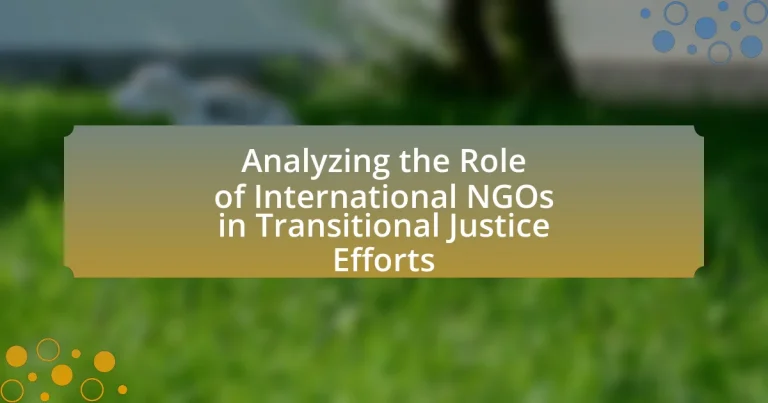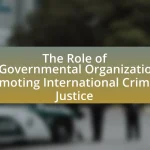International NGOs play a vital role in transitional justice efforts by advocating for accountability, promoting human rights, and supporting victims of past abuses. They engage in monitoring and documenting human rights violations, facilitating dialogue between affected communities and governments, and influencing policy changes. The article explores the specific functions of these organizations, their collaboration with local entities, the challenges they face, and the ethical dilemmas encountered in transitional justice contexts. Additionally, it highlights best practices and innovative approaches that enhance the effectiveness of International NGOs in promoting justice and reconciliation in post-conflict societies.
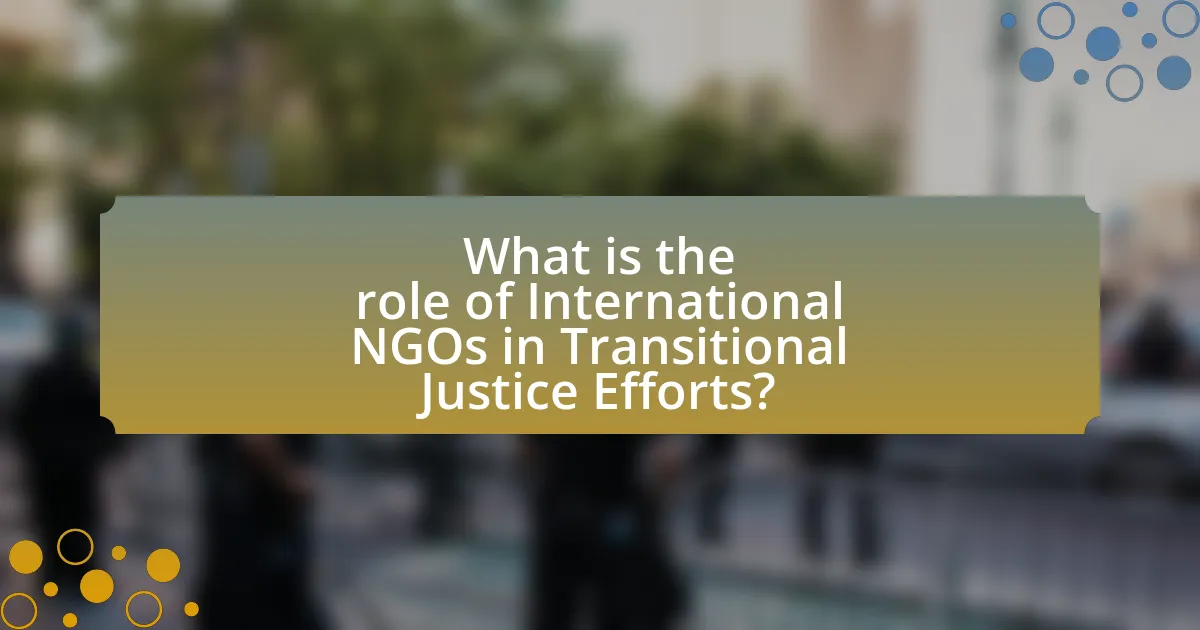
What is the role of International NGOs in Transitional Justice Efforts?
International NGOs play a crucial role in transitional justice efforts by advocating for accountability, promoting human rights, and supporting victims of past abuses. These organizations often engage in monitoring and documenting human rights violations, which provides essential evidence for legal proceedings and truth commissions. For instance, NGOs like Human Rights Watch and Amnesty International have been instrumental in gathering testimonies and reports that inform international legal standards and local justice mechanisms. Additionally, they facilitate dialogue between affected communities and governments, ensuring that the voices of victims are heard in the transitional justice process. Their involvement often leads to increased public awareness and pressure on governments to implement reforms, thereby enhancing the overall effectiveness of transitional justice initiatives.
How do International NGOs contribute to the process of Transitional Justice?
International NGOs contribute to the process of Transitional Justice by providing expertise, resources, and advocacy to support accountability and reconciliation efforts in post-conflict societies. They often facilitate dialogue between conflicting parties, promote human rights, and assist in the establishment of truth commissions, which are essential for uncovering past atrocities. For example, organizations like Human Rights Watch and Amnesty International have documented human rights violations and lobbied for legal reforms, influencing national and international policies. Their involvement helps ensure that victims’ voices are heard and that justice mechanisms are implemented effectively, thereby fostering societal healing and preventing future conflicts.
What specific functions do International NGOs serve in Transitional Justice initiatives?
International NGOs serve critical functions in Transitional Justice initiatives by promoting accountability, supporting victims, and facilitating dialogue. They advocate for legal reforms and the establishment of truth commissions, which are essential for addressing past human rights violations. For instance, organizations like Human Rights Watch and Amnesty International document abuses and push for justice mechanisms, thereby influencing policy changes in affected countries. Additionally, these NGOs provide psychosocial support and resources to victims, helping them navigate the complexities of the justice process. Their involvement often leads to increased public awareness and engagement, fostering a culture of accountability and reconciliation in post-conflict societies.
How do International NGOs collaborate with local organizations in Transitional Justice?
International NGOs collaborate with local organizations in Transitional Justice by providing technical assistance, funding, and capacity-building initiatives. This collaboration often involves joint projects that aim to address human rights violations and promote accountability within affected communities. For instance, organizations like Human Rights Watch and Amnesty International work alongside local NGOs to document abuses and advocate for legal reforms, ensuring that local voices are amplified in the justice process. Additionally, international NGOs facilitate training programs to enhance the skills of local activists, enabling them to effectively engage in transitional justice mechanisms. This partnership model not only strengthens local capacities but also fosters a more inclusive approach to justice that reflects the needs and perspectives of the communities involved.
Why are International NGOs important in Transitional Justice contexts?
International NGOs are crucial in Transitional Justice contexts because they provide expertise, resources, and advocacy that facilitate accountability and reconciliation processes. These organizations often possess specialized knowledge in human rights law and transitional justice mechanisms, enabling them to support local communities in documenting abuses and promoting legal reforms. For instance, NGOs like Human Rights Watch and Amnesty International have played significant roles in raising awareness about human rights violations and influencing policy changes in post-conflict societies. Their involvement can lead to increased international pressure on governments to uphold justice and can help ensure that victims’ voices are heard in the transitional processes.
What unique perspectives do International NGOs bring to Transitional Justice?
International NGOs bring diverse perspectives to Transitional Justice by emphasizing human rights, community engagement, and global best practices. Their focus on human rights ensures that victims’ voices are prioritized, as seen in organizations like Human Rights Watch, which documents abuses and advocates for accountability. Additionally, they promote community involvement, recognizing that local populations must play a central role in the justice process, as demonstrated by the work of the International Center for Transitional Justice, which supports local initiatives. Furthermore, International NGOs facilitate the sharing of global best practices, drawing from experiences in various contexts to inform and improve transitional justice mechanisms, as evidenced by the comparative studies conducted by the United Nations Development Programme.
How do International NGOs influence policy and legal frameworks in Transitional Justice?
International NGOs influence policy and legal frameworks in Transitional Justice by advocating for human rights standards, providing expertise, and facilitating dialogue among stakeholders. These organizations often engage in lobbying efforts to shape legislation and promote accountability for past atrocities, as seen in cases like the International Criminal Court’s establishment, where NGOs played a crucial role in pushing for legal frameworks that address war crimes and crimes against humanity. Their research and reports provide evidence that informs policymakers, while their grassroots initiatives mobilize public support, thereby creating pressure for legal reforms.
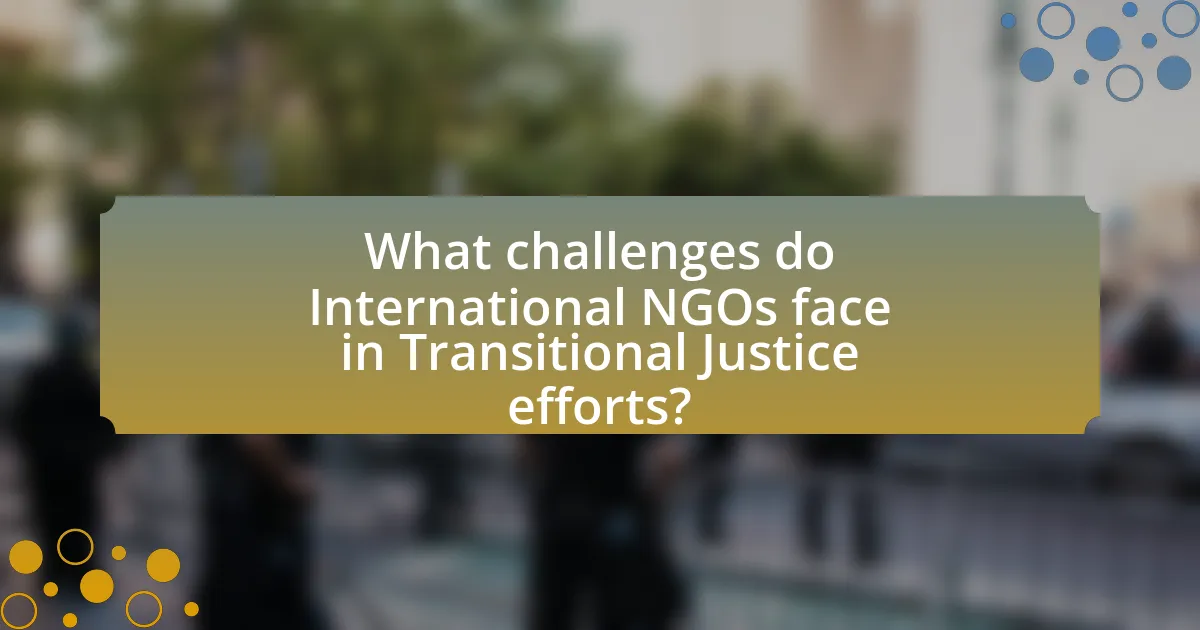
What challenges do International NGOs face in Transitional Justice efforts?
International NGOs face significant challenges in Transitional Justice efforts, including political resistance, limited funding, and cultural sensitivities. Political resistance often arises from local governments that may oppose accountability measures or fear the implications of justice processes, as seen in countries like Sudan where the government has obstructed international interventions. Limited funding restricts the capacity of NGOs to implement comprehensive programs, as many rely on donor support that can be inconsistent or insufficient. Cultural sensitivities also pose challenges, as NGOs must navigate local customs and beliefs while advocating for justice, which can lead to tensions between international norms and local practices, exemplified in contexts like Rwanda where traditional justice mechanisms coexist with international standards.
How do political environments impact the work of International NGOs in Transitional Justice?
Political environments significantly impact the work of International NGOs in Transitional Justice by influencing their operational capacity, legitimacy, and the effectiveness of their interventions. In authoritarian regimes, for instance, NGOs often face restrictions on their activities, limiting their ability to advocate for justice or support victims. Conversely, in democratic contexts, these organizations may benefit from greater freedom to operate and collaborate with local governments, enhancing their effectiveness. Research indicates that political stability and support from local authorities can lead to more successful transitional justice initiatives, as seen in countries like South Africa, where a conducive political environment facilitated the Truth and Reconciliation Commission’s work. Thus, the political landscape directly shapes the strategies and outcomes of International NGOs engaged in transitional justice efforts.
What are the risks associated with International NGOs operating in conflict-affected areas?
International NGOs operating in conflict-affected areas face significant risks, including security threats, operational challenges, and reputational damage. Security threats arise from armed groups, which may target NGOs for their resources or perceived political affiliations, leading to violence against staff and disruption of operations. Operational challenges include difficulties in accessing affected populations due to ongoing hostilities, logistical issues, and the need to navigate complex political landscapes. Reputational damage can occur if NGOs are perceived as biased or ineffective, which can undermine their credibility and hinder their ability to operate effectively. These risks are underscored by reports indicating that over 400 aid workers were attacked in conflict zones in 2020 alone, highlighting the precarious environment in which these organizations function.
How do funding limitations affect the effectiveness of International NGOs in Transitional Justice?
Funding limitations significantly hinder the effectiveness of International NGOs in Transitional Justice by restricting their operational capacity and resource allocation. When financial resources are inadequate, NGOs struggle to implement comprehensive programs, conduct necessary research, and engage with affected communities effectively. For instance, a study by the International Center for Transitional Justice found that NGOs with limited funding often cannot sustain long-term projects, which are crucial for building trust and ensuring community participation in justice processes. Additionally, funding constraints can lead to reduced staffing levels and expertise, further diminishing the quality of services provided. This cycle of underfunding ultimately compromises the NGOs’ ability to advocate for victims’ rights and contribute to meaningful justice outcomes.
What ethical dilemmas do International NGOs encounter in Transitional Justice?
International NGOs encounter several ethical dilemmas in Transitional Justice, primarily related to balancing justice and reconciliation. These organizations often face the challenge of addressing the needs of victims while also considering the potential for societal healing, which can lead to conflicts between pursuing accountability for perpetrators and fostering peace. For instance, the decision to support trials for war crimes may alienate certain communities that prioritize stability over justice. Additionally, NGOs must navigate the complexities of local cultural contexts, where their interventions might be perceived as imposing foreign values, potentially undermining local ownership of the justice process. These dilemmas are underscored by the need to maintain impartiality while advocating for human rights, as seen in cases where NGOs have been criticized for perceived biases in their support for specific groups or narratives.
How do International NGOs balance advocacy and neutrality in Transitional Justice?
International NGOs balance advocacy and neutrality in Transitional Justice by adopting a dual approach that emphasizes both engagement in human rights advocacy and adherence to impartiality. They engage in advocacy by raising awareness of injustices and promoting accountability for human rights violations, which is essential for fostering societal change and supporting victims. Simultaneously, they maintain neutrality by ensuring that their actions do not favor any political party or faction, thereby preserving their credibility and ability to operate in conflict-affected areas. This balance is crucial, as it allows NGOs to effectively contribute to justice processes while being perceived as unbiased actors, which is supported by frameworks such as the United Nations Guiding Principles on Business and Human Rights that stress the importance of neutrality in humanitarian efforts.
What are the implications of International NGOs’ actions on local communities in Transitional Justice?
International NGOs significantly influence local communities in Transitional Justice by shaping policies, providing resources, and facilitating dialogue. Their actions can empower communities by promoting accountability and human rights, as seen in post-conflict societies where NGOs have helped establish truth commissions, such as in South Africa, which contributed to national reconciliation. However, these organizations can also create dependency, undermine local initiatives, or impose external values that may not align with community needs, as evidenced by critiques of NGO interventions in countries like Haiti, where local voices were often marginalized. Thus, while International NGOs can drive positive change, their impact on local communities in Transitional Justice is complex and multifaceted, requiring careful consideration of local contexts and needs.
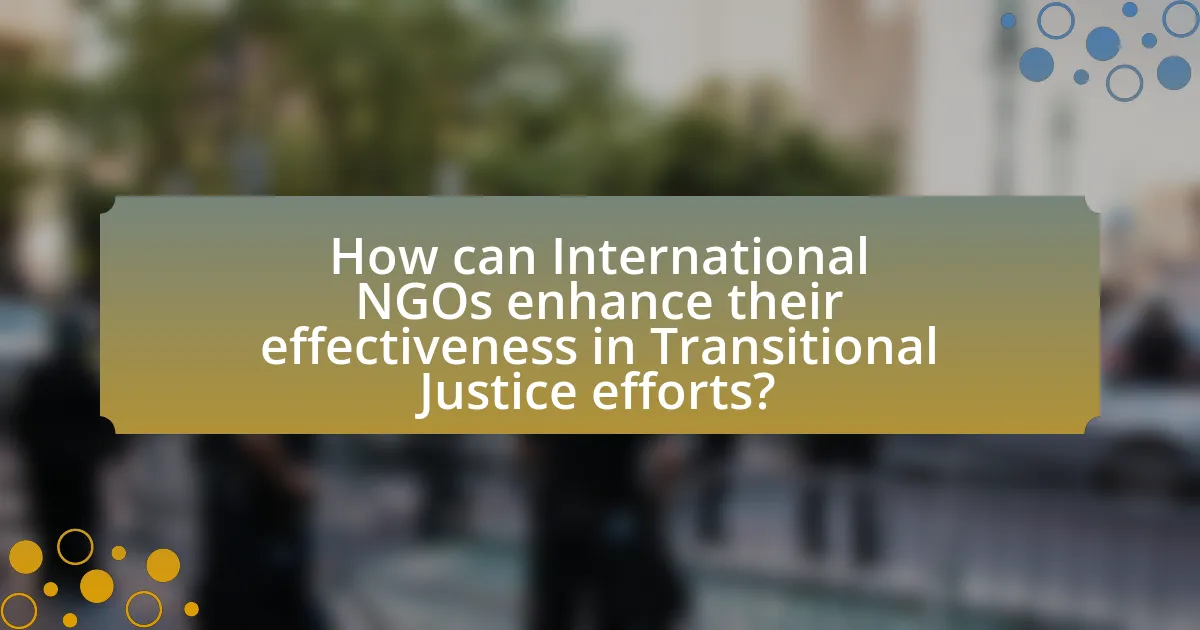
How can International NGOs enhance their effectiveness in Transitional Justice efforts?
International NGOs can enhance their effectiveness in Transitional Justice efforts by fostering local partnerships and ensuring community involvement. Engaging with local organizations allows NGOs to leverage indigenous knowledge and build trust within communities, which is crucial for the success of transitional justice initiatives. For instance, the International Center for Transitional Justice has demonstrated that collaboration with local actors leads to more culturally relevant and accepted justice mechanisms. Additionally, NGOs can provide training and resources to local stakeholders, empowering them to take active roles in the transitional justice process. This approach not only increases the sustainability of efforts but also aligns with the principles of ownership and inclusivity, which are essential for effective transitional justice.
What best practices can International NGOs adopt in Transitional Justice initiatives?
International NGOs can adopt several best practices in Transitional Justice initiatives, including promoting local ownership, ensuring inclusivity, and fostering transparency. Promoting local ownership involves engaging communities in the design and implementation of justice processes, which enhances legitimacy and sustainability. Ensuring inclusivity means actively involving marginalized groups, such as women and ethnic minorities, to address their specific needs and perspectives, as evidenced by the UN’s emphasis on gender-sensitive approaches in transitional justice. Fostering transparency in processes and decision-making builds trust among stakeholders and encourages public participation, which is crucial for effective justice outcomes. These practices are supported by various case studies, such as the Truth and Reconciliation Commission in South Africa, which highlighted the importance of community involvement and transparency in achieving restorative justice.
How can International NGOs improve their engagement with affected communities?
International NGOs can improve their engagement with affected communities by implementing participatory approaches that prioritize local voices and needs. Engaging communities through regular consultations, feedback mechanisms, and collaborative decision-making processes ensures that their perspectives shape the interventions. Research indicates that when NGOs actively involve communities in program design and implementation, the effectiveness of aid increases significantly, as seen in the World Bank’s findings that community-driven development projects can lead to better outcomes and sustainability. By fostering trust and transparency, NGOs can build stronger relationships with communities, ultimately enhancing their impact in transitional justice efforts.
What strategies can International NGOs implement to ensure sustainability in Transitional Justice efforts?
International NGOs can implement strategies such as community engagement, capacity building, and collaboration with local organizations to ensure sustainability in Transitional Justice efforts. Community engagement fosters local ownership and participation, which is crucial for the long-term success of justice initiatives. Capacity building equips local actors with the necessary skills and knowledge to continue justice processes independently, as evidenced by programs in countries like South Africa, where local NGOs played a pivotal role in sustaining the Truth and Reconciliation Commission’s outcomes. Collaboration with local organizations enhances resource sharing and contextual understanding, ensuring that transitional justice mechanisms are culturally relevant and supported by the community.
What lessons can be learned from successful International NGO interventions in Transitional Justice?
Successful International NGO interventions in Transitional Justice demonstrate the importance of local engagement, adaptability, and the integration of diverse perspectives. Engaging local communities ensures that interventions are culturally relevant and address the specific needs of affected populations, as seen in the work of organizations like the International Center for Transitional Justice, which emphasizes community involvement in truth-telling processes. Adaptability is crucial, as successful NGOs often tailor their strategies to the evolving political and social contexts of the regions they operate in, exemplified by the flexibility shown by Human Rights Watch in responding to changing dynamics in post-conflict societies. Furthermore, integrating diverse perspectives, including those of marginalized groups, enhances the legitimacy and effectiveness of transitional justice mechanisms, as highlighted by the experiences of the Coalition for the International Criminal Court, which advocates for inclusive approaches to justice. These lessons underscore the necessity for NGOs to prioritize local collaboration, remain responsive to contextual changes, and ensure inclusivity in their transitional justice efforts.
How have specific case studies demonstrated the impact of International NGOs in Transitional Justice?
Specific case studies have demonstrated that International NGOs significantly influence Transitional Justice by facilitating accountability, promoting victim participation, and supporting legal reforms. For instance, the International Center for Transitional Justice (ICTJ) played a crucial role in Colombia by advocating for the inclusion of victims’ voices in peace negotiations, which led to the establishment of the Special Jurisdiction for Peace. This initiative aimed to address human rights violations during the armed conflict, showcasing how NGOs can shape legal frameworks and ensure that justice mechanisms are responsive to the needs of affected communities. Additionally, in Sierra Leone, NGOs like the Center for Accountability and Rule of Law contributed to the establishment of the Truth and Reconciliation Commission, which highlighted the importance of truth-telling in healing and rebuilding trust in post-conflict societies. These examples illustrate the tangible impact of International NGOs in promoting justice and reconciliation in transitional contexts.
What innovative approaches have International NGOs used to address Transitional Justice challenges?
International NGOs have employed innovative approaches such as community-based reconciliation programs, digital documentation of human rights abuses, and participatory justice mechanisms to address Transitional Justice challenges. Community-based reconciliation programs facilitate dialogue among conflicting groups, fostering understanding and healing, as seen in initiatives by organizations like Search for Common Ground. Digital documentation, utilized by NGOs like Human Rights Watch, allows for the collection and preservation of evidence regarding human rights violations, enhancing accountability. Participatory justice mechanisms, exemplified by the work of the International Center for Transitional Justice, engage affected communities in the justice process, ensuring their voices are heard and their needs addressed. These approaches demonstrate the adaptability and responsiveness of International NGOs in navigating complex Transitional Justice landscapes.
What practical steps can International NGOs take to strengthen their role in Transitional Justice?
International NGOs can strengthen their role in Transitional Justice by actively engaging in advocacy, capacity building, and community involvement. Advocacy efforts should focus on influencing policy changes that support justice mechanisms, as seen in the work of organizations like Human Rights Watch, which has successfully lobbied for accountability in various countries. Capacity building involves training local organizations and stakeholders in legal frameworks and human rights standards, enhancing their ability to participate in justice processes. Community involvement is crucial; NGOs should facilitate dialogues between victims and perpetrators, fostering reconciliation and healing, as demonstrated by the Truth and Reconciliation Commission in South Africa. These steps collectively enhance the effectiveness and legitimacy of Transitional Justice initiatives.
